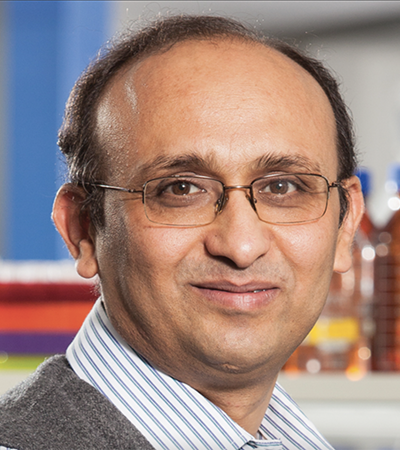Gokhale named biotech secretary; Wecewicz receives alumni award
Gokhale takes over as government biotechnology secretary
Rajesh Gokhale, who studies tuberculosis at India's National Institute of Immunology in New Delhi, has been appointed the secretary of the Indian Department of Biotechnology. He started in this new position on November 1.

The Department of Biotechnology, part of the ministry of science and technology, funds scholarships, research awards and scientific training efforts; coordinates large studies such as cataloging genetic variation in India; administers core facilities for advanced imaging, electron microscopy and mass spectrometry; and supports independent research institutes with a variety of focus areas. As the department’s secretary, Gokhale will be second in command to biotechnology minister Jitendra Singh, who reports to the prime minister of India.
Gokhale's research focuses on mycobacterium tuberculosis, the pathogen that causes tuberculosis, and its metabolism. He studies polyketide synthases, which generate a wide variety of metabolites that contribute to pathogenicity. He also has studied skin pigmentation, contributing to scientific understanding of the autoimmune disorder vitiligo.
Gokhale is a past member of the editorial board of the Journal of Biological Chemistry and a former Howard Hughes Medical Institute international scholar. In addition to other honors, he is a fellow of the Indian National Science Academy, the National Academy of Sciences India and the India Academy of Sciences.
Young alumni award for Wencewicz
Timothy Wencewicz, an associate professor at Washington University in St. Louis, received the Southeast Missouri State University Alumni Association's Distinguished Young Alumni award in October.

Wencewicz studies antimicrobial resistance, including investigations into the microbial enzymes that break down and inactivate currently available antibiotics. He has studied new potential antimicrobial delivery systems, such as conjugating an antimicrobial agent to a siderophore, a type of iron-conjugating molecule that many microbes use to scavenge iron from the environment, to sneak the antimicrobial molecule into the cell.
After he attended Southeast Missouri State University as an undergraduate, Wencewicz earned his Ph.D. in chemistry at the University of Notre Dame and trained as a postdoc at Harvard Medical School. He returned to Missouri in 2013 to join the faculty at Washington University.
Wencewicz serves on the editorial boards of the Journal of Biological Chemistry and the Journal of Antibiotics. In addition to this recent honor, he has received he has received are a Cottrell Scholar Award, a Camille Dreyfus Teacher–Scholar Award and a Sloan Research Fellowship in chemistry.
Enjoy reading ASBMB Today?
Become a member to receive the print edition four times a year and the digital edition monthly.
Learn moreGet the latest from ASBMB Today
Enter your email address, and we’ll send you a weekly email with recent articles, interviews and more.
Latest in People
People highlights or most popular articles

From humble beginnings to unlocking lysosomal secrets
Monther Abu–Remaileh will receive the ASBMB’s 2026 Walter A. Shaw Young Investigator Award in Lipid Research at the ASBMB Annual Meeting, March 7-10 in Washington, D.C.

Chemistry meets biology to thwart parasites
Margaret Phillips will receive the Alice and C. C. Wang Award in Molecular Parasitology at the ASBMB Annual Meeting, March 7-10 in Washington, D.C.

ASBMB announces 2026 JBC/Tabor awardees
The seven awardees are first authors of outstanding papers published in 2025 in the Journal of Biological Chemistry.

Decoding how bacteria flip host’s molecular switches
Kim Orth will receive the Earl and Thressa Stadtman Distinguished Scientists Award at the ASBMB Annual Meeting, March 7–10, just outside of Washington, D.C.

Thiam elected to EMBO
He was recognized during the EMBO Members’ Meeting in Heidelberg, Germany, in October.

The timekeepers of proteostasis
Learn about the cover of the winter 2026 ASBMB Today issue, illustrated by ASBMB member Megan Mitchem.
